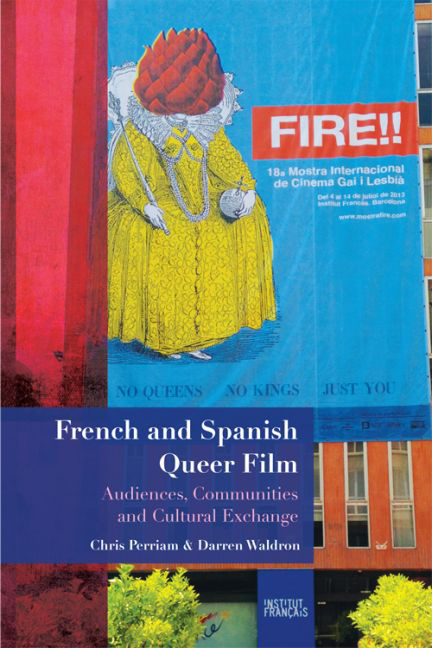Book contents
- Frontmatter
- Contents
- List of Figures
- Acknowledgements
- Introduction
- 1 Cultural Crossovers
- 2 LGBTQ Film Festivals and their Audiences
- 3 LGBQ Themes and Responses
- 4 Trans Issues
- 5 Audiences and Critics: Dialogue and Disagreement
- Conclusion
- Appendix I: Standard Questions for Respondents
- Appendix II: Project Web Page
- Filmography
- References
- Index
3 - LGBQ Themes and Responses
Published online by Cambridge University Press: 12 September 2017
- Frontmatter
- Contents
- List of Figures
- Acknowledgements
- Introduction
- 1 Cultural Crossovers
- 2 LGBTQ Film Festivals and their Audiences
- 3 LGBQ Themes and Responses
- 4 Trans Issues
- 5 Audiences and Critics: Dialogue and Disagreement
- Conclusion
- Appendix I: Standard Questions for Respondents
- Appendix II: Project Web Page
- Filmography
- References
- Index
Summary
The director presented ‘us’ as normal, and our experiences as normal. We are passionate, eloquent and aware of our experiences. (Sarah, a forty-two-year-old white British security officer after the screening of Les Invisibles at Flare, London, March 2013)
Respecto a la representación de la sexualidad en el cine francés, pienso que en general suele ser tratada de forma más sutil y más delicada que en otro tipo de cine, como pueda ser el americano o el español.
(As to the representation of sexuality in French cinema, I think in general it's dealt with more subtly and delicately than in other sorts of cinema, American or Spanish for example.) (José María, a forty-two-year-old white Spanish male researcher in a follow-up email to his response to a screening of Notre paradis at the LesGaiCineMad, Madrid, November 2012)
Two viewer responses, about two different films that explore two different issues – ageing among lesbians, gay men and queers in Les Invisibles (Sébastien Lifshitz, 2012), and the treatment of (homo-)sexuality in Notre paradis (Gaël Morel, 2011) – expressed in two different locations, in two different languages and in response to two different genres of film, one documentary, the other fiction. Two different stances, also; yet they both suggest that the film's modality, its interviewees or characters, their actual or portrayed lifestyles and experiences, serve as comparative resources for understanding sexuality. These are ‘our’ experiences, alleges Sarah, and French cinema is in some ways a better way of representing a core aspect of them, according to José María. The ways in which viewers claim such representations from abroad as having particular resonances with their own sense of selves and experiences, or apprehend them as distinct from themselves and their encounter with the world, and what this means in terms of cross-cultural reception and affiliations, will be the focus of this chapter.
Three dominant themes emerge in the films discussed: ageing among lesbians, gay men and bisexuals; gay male, and, to a much lesser extent, lesbian and bisexual desires and identities; and a sense of shared experience, which manifests variously as a stake in community history or as a more personalised mark of identity.
- Type
- Chapter
- Information
- French and Spanish Queer FilmAudiences, Communities and Cultural Exchange, pp. 68 - 101Publisher: Edinburgh University PressPrint publication year: 2016



